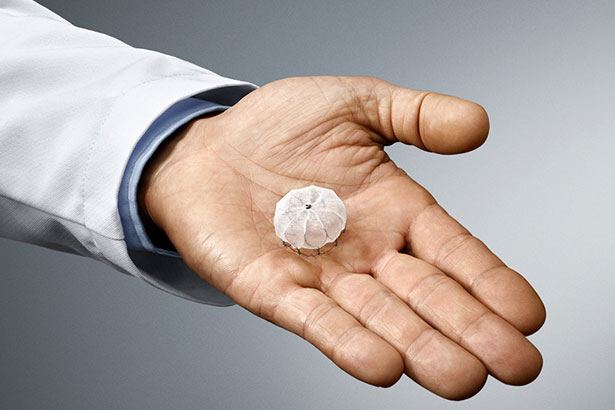
Stroke-Risk Treatment Alternative for Atrial Fibrillation Avoids Bleeding Complications
March 13, 2019 – Englewood Health is among the first hospitals in North Jersey to complete its 100th implant of the lifesaving WATCHMAN device, which reduces the risk of blood clots, stroke, and death in patients with irregular heartbeat without long-term blood-thinning medications.
For patients on blood thinners—which is most patients with atrial fibrillation—something as simple as a fall or as major as a car accident could cause harmful, even fatal, internal bleeding. The WATCHMAN device allows patients to stop taking these medications and return to active lifestyles with less fear and fewer changes.
 “Patients who can’t tolerate blood thinners are really in a tough situation because they need blood thinners to prevent stroke, but if they take blood thinners they have bleeding complications,” said Grant Simons, MD, chief of heart rhythm services at Englewood Health. “For those with non-valvular atrial fibrillation who are seeking an alternative to warfarin, the WATCHMAN implant offers a potentially life-changing stroke-risk treatment option, which could free them from the challenges of long-term warfarin therapy.”
“Patients who can’t tolerate blood thinners are really in a tough situation because they need blood thinners to prevent stroke, but if they take blood thinners they have bleeding complications,” said Grant Simons, MD, chief of heart rhythm services at Englewood Health. “For those with non-valvular atrial fibrillation who are seeking an alternative to warfarin, the WATCHMAN implant offers a potentially life-changing stroke-risk treatment option, which could free them from the challenges of long-term warfarin therapy.”
In a clinical trial, nine out of 10 people were able to stop taking warfarin in 45 days after the WATCHMAN procedure.
The size of a quarter, the WATCHMAN device fits into the left atrial appendage (LAA), where 90% of stroke-causing blood clots that originate in the heart are formed. The implant permanently closes off this part of the heart to keep those blood clots from escaping, entering the blood stream, and traveling to the brain, lungs, and other parts of the body.
The WATCHMAN implant, performed via a catheter inserted in the groin, is a one-time procedure that lasts about an hour, followed by an overnight hospital stay with most patients leaving the next day.
Candidates for the device include patients who have atrial fibrillation not caused by heart valve problems, are able to take short-term blood-thinning medications after the procedure, and are poor candidates for long-term blood-thinning medications.
Atrial fibrillation is a common condition affecting more than five million people in the United States. It causes blood to pool in the LAA, sometimes leading to the formation of clots that can break loose and travel up to the brain, potentially causing a stroke. In fact, people with atrial fibrillation have five times the risk of stroke than compared to those with a regular heartbeat.
The WATCHMAN device has been implanted in more than 10,000 patients and is approved in more than 70 countries around the world. Manufactured by Boston Scientific Corporation, the WATCHMAN implant was approved by the Food and Drug Administration in 2015. Englewood Health had performed northern New Jersey’s first implant during the second phase of its national clinical trial back in 2012. Englewood Health’s 100th WATCHMAN procedure came at the close of American Heart month this year.
“We continue to be at the forefront of available technologies,” said Dr. Simons. “This is a relatively new procedure that we were able to introduce to the medical community and deliver to our patients through a high-volume, high-quality program developed safely in a short amount of time.”

Stroke-Risk Treatment Alternative for Atrial Fibrillation Avoids Bleeding Complications
